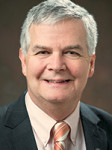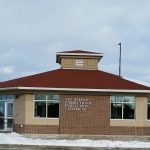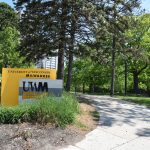We Must Bounce Back Together
The virus can easily spread to smaller towns and rural areas if safeguards are not in place.
![Stockholm WI. Photo by Royalbroil (Own work) [CC BY-SA 4.0 (https://creativecommons.org/licenses/by-sa/4.0)], via Wikimedia Commons](https://urbanmilwaukee.com/wp-content/uploads/2017/11/Stockholm_Wisconsin_Downtown_WIS35.jpg)
Stockholm, WI. Photo by Royalbroil (Own work) (CC BY-SA 4.0), via Wikimedia Commons
Although the “Safer at Home” order was extended, there are some changes from the original order that became effective on April 24th, which include: public libraries may provide curbside pick-up; golf courses may open again; non-essential businesses can do more things such as deliveries, mailings, and curbside pick-up; arts and craft stores may offer expanded curbside pick-up of materials to make face masks, and residents can take care of aesthetic or optional exterior lawn care or construction.
Throughout this crisis, these policy decisions have been made in the interest of public health and safety in consultation with scientists and medical professionals. Several weeks ago, the Department of Health Services projected that Wisconsin could have 440 to 1,500 deaths statewide if we did not practice social distancing to flatten the curve. The collaborative effort made by Wisconsinites in all corners of the state proved that the “Safer at Home” order works to slow the spread of COVID-19. In just the first three weeks of the “Safer at Home” order, Wisconsin saved at least 300 lives and perhaps as many as 1,400 lives.
Rural communities are not immune to the effects of COVID-19. Although the prevalence of COVID-19 is much higher in urban areas, like Madison or Milwaukee, the virus can easily spread to other counties if these safeguards are not in place. A COVID-19 outbreak in rural Wisconsin could have a detrimental impact on our close-knit communities. Our population in rural communities tends to be older and much more at risk of dying from COVID-19. We have fewer resources and less access to health care options to care for the sick than urban areas.
If one area of our state begins to lift the “Safer at Home” order, there could be a rush to those communities which will create a greater danger of COVID-19 transmission. This statewide plan is in place to protect ALL Wisconsin residents and help our state grow more resilient together.
For Wisconsin to get through this safely and become more resilient, Governor Evers introduced the Badger Bounce Back Plan, which outlines a process to help Wisconsin move forward from this pandemic. It is based on federal guidelines released from the White House on April 16th. It includes certain gating criteria each state should meet before gradually restarting its economy in three phases.
To move from phase to phase, Wisconsin must have a downward trajectory of influenza-like illnesses, COVID-19 cases and symptoms, and positive tests as a percent of total tests within a 14-day period. Additionally, hospitals will have to treat all patients without crisis care and have robust testing programs in place for at-risk healthcare workers.
The Evers’ administration is working closely with businesses and private partners to reach the gating criteria and re-open Wisconsin. To do this, the Badger Bounce Back Plan has steps in place to expand COVID-19 testing by 85,000 tests per week; increase contact tracing to better understand virus transmission in Wisconsin, and improve tracking systems to keep Wisconsin better informed.
We are all anxious to return to life as we knew it. I fall into that category as well. But, let’s face it, our world is changed forever from this dramatic experience. Getting back too soon or opening up certain regions will not make things better and could only make things worse. Let’s keep up our diligence and consider those who stayed healthy because we stayed safe at home.
Wisconsin State Senator Jeff Smith represents Wisconsin’s 31st Senate District.
More about the Coronavirus Pandemic
- Governors Tony Evers, JB Pritzker, Tim Walz, and Gretchen Whitmer Issue a Joint Statement Concerning Reports that Donald Trump Gave Russian Dictator Putin American COVID-19 Supplies - Gov. Tony Evers - Oct 11th, 2024
- MHD Release: Milwaukee Health Department Launches COVID-19 Wastewater Testing Dashboard - City of Milwaukee Health Department - Jan 23rd, 2024
- Milwaukee County Announces New Policies Related to COVID-19 Pandemic - David Crowley - May 9th, 2023
- DHS Details End of Emergency COVID-19 Response - Wisconsin Department of Health Services - Apr 26th, 2023
- Milwaukee Health Department Announces Upcoming Changes to COVID-19 Services - City of Milwaukee Health Department - Mar 17th, 2023
- Fitzgerald Applauds Passage of COVID-19 Origin Act - U.S. Rep. Scott Fitzgerald - Mar 10th, 2023
- DHS Expands Free COVID-19 Testing Program - Wisconsin Department of Health Services - Feb 10th, 2023
- MKE County: COVID-19 Hospitalizations Rising - Graham Kilmer - Jan 16th, 2023
- Not Enough Getting Bivalent Booster Shots, State Health Officials Warn - Gaby Vinick - Dec 26th, 2022
- Nearly All Wisconsinites Age 6 Months and Older Now Eligible for Updated COVID-19 Vaccine - Wisconsin Department of Health Services - Dec 15th, 2022
Read more about Coronavirus Pandemic here





















